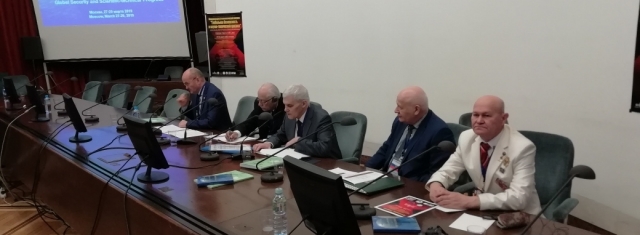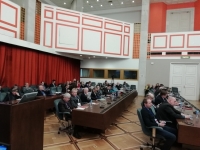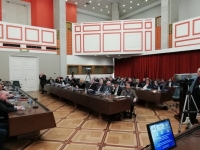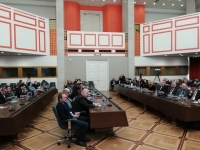Politics
Geopolitical Congress - Global Security, Scientific and Technological Progress
Geopolitics in Mocow

Board of the Geopolitical Congress - Moscow (Source: Press-Release of the All-Slavic Union)
Press-Release of the All-Slavic Union -
In Moscow, from March 27th to March 29th 2019, the “žInternational Geopolitical Congress on Global Security - and Scientific Technological Progress." has been held within the building of the Academy of Sciences of the Russian Federation in their “žPresidential Hall“.
These congress was initiated by the Russian Academy of Rocket and Artillery Sciences, the Russian Academy of Sciences, the Russian World Service International Public Movement, the World Advanced Research Project - the WARP-Group (Community of Scientists of the World Advanced Research Program) with the support of Universidad Autónoma Metropolitana - UAM (Autonomous University of Mexico City). The concept of the Congress was approved by the Russian Academy of Sciences, the Ministry of Defense and the Ministry of Foreign Affairs of the Russian Federation.
The congress was further more organized with the support and participation of the “International Union of Public Associations - All-Slavic Union", "Union of Officers of the Russian Army" and other organizations.
These congress was initiated by the Russian Academy of Rocket and Artillery Sciences, the Russian Academy of Sciences, the Russian World Service International Public Movement, the World Advanced Research Project - the WARP-Group (Community of Scientists of the World Advanced Research Program) with the support of Universidad Autónoma Metropolitana - UAM (Autonomous University of Mexico City). The concept of the Congress was approved by the Russian Academy of Sciences, the Ministry of Defense and the Ministry of Foreign Affairs of the Russian Federation.
The congress was further more organized with the support and participation of the “International Union of Public Associations - All-Slavic Union", "Union of Officers of the Russian Army" and other organizations.
At the congress attended: representatives of the scientific community, prominent scientists, experts in the field of Geopolitics, public and political figures, heads of news agencies from a number of countries including: Brazil, Mexico, Cuba, China, Vietnam, Turkey, Norway, Belgium, Germany, Austria, Poland, the Czech Republic, Slovakia, Bulgaria, Belarus, DNR, LC.
Representatives of the Ministry of Defense of the Russian Federation and the Ministry of Foreign Affairs of the Russian Federation took part in the work of the Congress. For example: Member of the Committee on Defense and Security of the Council of Federation of the Federal Assembly of the Russian Federation, F. Klintsevich. President of the Republic of South Ossetia 2001-2011, E.Yu. Kokoita as well as Colonel V.V. Kvachkov, and other famous people.
Representatives of the Ministry of Defense of the Russian Federation and the Ministry of Foreign Affairs of the Russian Federation took part in the work of the Congress. For example: Member of the Committee on Defense and Security of the Council of Federation of the Federal Assembly of the Russian Federation, F. Klintsevich. President of the Republic of South Ossetia 2001-2011, E.Yu. Kokoita as well as Colonel V.V. Kvachkov, and other famous people.
The All-Slavic Union has taken an active part in the preparation of the Congress. Member of the Presidium of the All-Union Public Organization of Public Organization “All-Slavic Union“, WRIO Co-Chairman of the “Union of Officers“ V.Yu. Sadkov was a member of the Organizing Committee of the Congress. The same speakers made presentations: General Secretary of the All-Slavic Committee MO Milos Zverin (Slovakia), editor of the Glavnye Novosti news portal E. I. Paltsev (Slovakia), head of the Russian-Czech informamtion portal Rostislav Vlchek (Czech Republic), member of the Presidium of the All-Slavic Union All-Ukrainian Public Organization of Entrepreneurs Pavel Zeminsky (Poland), Anzhej Skorski (Poland), Co-Chairman of the Public Association Oplot S. Tsvetomir Getov (Bulgaria), chairman of the department of the “Fund for War Veterans and Participants of Armed Conflicts“ in the Donbas of S. B. Potok, other representatives of the All-Slavic Union and of the Belarusian Slavinian Committee. The following topics were discussed at the congress:
1. Philosophical and ideological problems of modern progress and global security.
2. Progress in the field of basic research and the threats to global security they engender.
3. The development of armaments and the problems of global security.
4. Achievements of information technology and security problems associated with this
5. Energy aspects of global security.
6. Environmental aspects of global security.
7. Scientific and technical progress in the fields of communications, transport and production, the related problems of global security.
8. Socio-political consequences of modern scientific and technological progress.
9. Ways to parry the threats formed by modern scientific and technological progress.
10. The role and place of the scientific and technical community in preventing the occurrence of threats generated by modern scientific and technological progress.
11. Responsibility of the scientific and technical community for the consequences of the implementation of scientific and technological achievements.
2. Progress in the field of basic research and the threats to global security they engender.
3. The development of armaments and the problems of global security.
4. Achievements of information technology and security problems associated with this
5. Energy aspects of global security.
6. Environmental aspects of global security.
7. Scientific and technical progress in the fields of communications, transport and production, the related problems of global security.
8. Socio-political consequences of modern scientific and technological progress.
9. Ways to parry the threats formed by modern scientific and technological progress.
10. The role and place of the scientific and technical community in preventing the occurrence of threats generated by modern scientific and technological progress.
11. Responsibility of the scientific and technical community for the consequences of the implementation of scientific and technological achievements.
12. Forms of organization of the international scientific and technical community in the interests of preventing the negative consequences of scientific and technological progress.
13. Artificial intelligence in the security system of the future, management of the intelligence of the future.
During the work of the congress, a conclusions was made by the participants: Our civilization is driven forward by scientists, thanks to their discoveries. And politicians, businessmen and others, political elites dominating in the countries and oligarchy - only use the fruits of scientists, as a rule - in their own interests. Often the great fundamental discoveries were not only for the benefit of mankind, but also to the detriment. The latest and promising achievements of science have already given mankind such power today that their use could harm the death of Civilization. This raises a problem - control over the use of scientific advances, especially in the areas of: weapons, Nano-Technology, Genetic Engineering, Neuroscience, Artificial Intelligence, the introduction of new Information Technologies, in the Cyber Environment, the dangers associated with the use of new drugs developed using nano and biotechnology, etc. It is noted that any, even the most progressive and socially oriented technology has its limits of application, through which it can cause damage - not comparable with a positive result.
A wide range of legal, organizational and other measures are being taken in the world to monitor the use of science. However, they are ineffective, since the scientific community itself is largely excluded from them. Meanwhile, only the scientific community can fully monitor and predict the possibilities for using their achievements for unkind purposes. In this regard, the scientific community must realize the full extent of its responsibility for the use of the fruits of their labor. This responsibility is not legal, but moral and moral, dictated by the understanding of the whole measure of danger for Mankind of the use of the power that SCIENCE gives to the Civilization, for selfish and unkind purposes. This implies the need for the active influence of the scientific community on the direction of applying the achievements of progress.
It was noted about the need to change the paradigm from "Man for the Economy" to "Economy for Man." About the growing role of education in the world, which can allow each person to perceive the essence of the ongoing transformations in the world and respond adequately to them.
Forms of neo-colonial Politics: The challenges of the twenty-first century were discussed: the growing threats in the era of ongoing global changes in all spheres of life on the planet, understanding the "crisis model of technological civilization." Interception of management of world processes by the leaders of TNCs and banking systems, new and new values. Problems of development of adequate models and technologies of the world community organization. Problems of environmental safety in the world. Questions prevent the occurrence of military conflicts on the planet.
The congress discussed US foreign policy in Latin America, with respect to the countries of Europe, in the Middle East, relations with China. On the situation in the Donbas, the delegates from Ukraine told the DNI and LC. Colonel V.V. Kvachkov delivered a report at the congress.
Forms of neo-colonial Politics: The challenges of the twenty-first century were discussed: the growing threats in the era of ongoing global changes in all spheres of life on the planet, understanding the "crisis model of technological civilization." Interception of management of world processes by the leaders of TNCs and banking systems, new and new values. Problems of development of adequate models and technologies of the world community organization. Problems of environmental safety in the world. Questions prevent the occurrence of military conflicts on the planet.
The congress discussed US foreign policy in Latin America, with respect to the countries of Europe, in the Middle East, relations with China. On the situation in the Donbas, the delegates from Ukraine told the DNI and LC. Colonel V.V. Kvachkov delivered a report at the congress.
Doctor of Military Sciences, a well-known expert in the field of Geopolitics, Co-Chairman of the Organizing Committee of the Congress, Konstantin Sivkov, in his report suggested considering the role and place of the scientific community in preventing the occurrence of threats generated by modern scientific and technological progress. And emphasized the need to create a network community in the scientific world, in order to guaranty safe progress. “The basis of its activities put the principles of equality, voluntariness, internationalism and mutual awareness. “..... We do not expect that the emergence of the International Community“ Scientists for Safe Progress “will radically change the situation in the field of control over the application of scientific and technical achievements and prevent their use for the sake of evil to Humanity. But with something you need start ... ", he said.
V.Yu. Sadkov, Professor Heinz Dietrich, Doctor of Sociological and Economic Sciences (Mexico) and a number of other speakers developed this idea in their speeches. Following the results of the congress, a draft resolution was adopted, which is now in discussion among delegates of the congress and scientific community. A resolution of the Congress after the adoption will be made public.
Source: Press Service of the All-Slavic Union
Source: Press Service of the All-Slavic Union
Geopoltics Science Technology Moscow Defense Ministry Konstantin Sivkov Military Science Vladimir Sadkov All-slavic Union
Liability for this article lies with the author, who also holds the copyright. Editorial content from USPA may be quoted on other websites as long as the quote comprises no more than 5% of the entire text, is marked as such and the source is named (via hyperlink).








